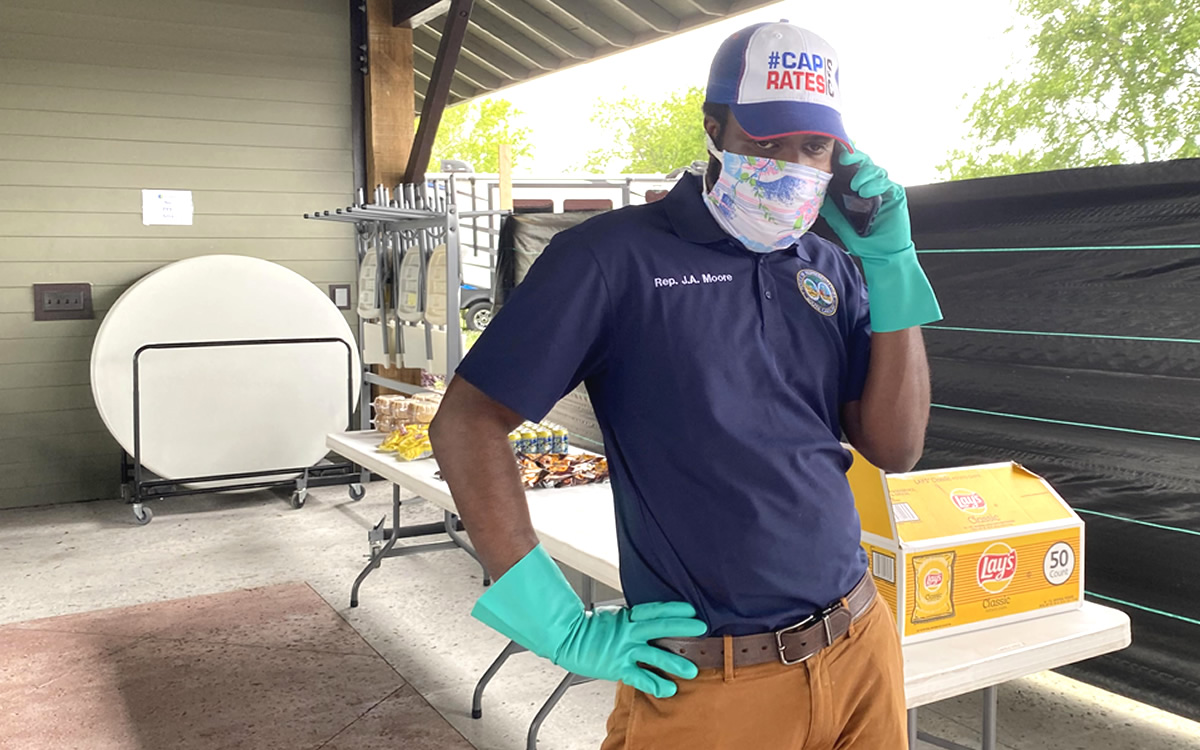
By Lindsay Street, Statehouse correspondent | Members of South Carolina’s poorest and ethnic minority communities say they can help build a more resilient state, post-pandemic.
“We’re living in a time, unfortunately, that is trying and putting to the test the fairness, the equity of all of our systems,” said Bernie Mazyck of Summerville, who serves as CEO of S.C. Association for Community Economic Development. “It should give everyone, up and down the social strata, give all of us a moment to pause and look at what we currently have, to reflect upon it and say, ‘Something’s wrong here, we need to rethink some things.’”
African Americans in the state are more likely than white people to die from COVID-19. Furthermore, those who have trouble accessing health care are less likely to be tested, and some of the lowest wage-earners in the state are the ones keeping essential services, such as grocery stores, running. Advocates said those at the margins have been impacted harder by the pandemic than the mostly white middle class.
According to the U.S. Census 2018 estimates, South Carolina’s blacks comprise 27.1 percent of the population. Hispanics account for 5.9 percent and Native Indians account for 0.5 percent of the population. White residents represent 68.5 percent of the population.
Not experiencing pandemic similarly
“Politics aside, take a step back and look at the people who have continually exposed themselves and families to this virus so we can have food on our table,” journalist and immigrant advocate Fernando Soto of Charleston said. “Take a step back and take it all in and realize, while we go through this pandemic together, and we’re not all in it together in the same way.”
It was a sentiment repeated by many for this story.
“Black folks and Latinos and other marginalized, low-income communities, they’re the ones on the front lines,” North Charleston Democratic Rep. J.A. Moore said. “Until we protect folks in the community I represent, not just identity-wise, then the whole state is vulnerable, the whole idea of taking care of the least of these because the least of these is who takes care of us.”
Mexican immigrant Sonia Villegas of North Charleston said while many people in the state have tried to stay home during the pandemic, many in the immigrant community have had to work.
“Unfortunately, we are people who live day-by-day and we need to work,” she said. . “There’s a lot of friends who have been able to stay home but a lot of single moms I know, they have to go out and look for the food and work every single day. If they don’t work, they can’t feed their children.”
Inequities exposed
For some, the pandemic has exposed underlying inequities and could be the start of a conversation.

“I hope we use this epidemic as a conversation to uplift issues that were already there before COVID-19 ever introduced itself to our state,” said Ashley Page of Columbia, who works as a SNAP-Ed program coordinator at the University of South Carolina.
And, they say, now is the time to listen to the communities most deeply impacted by the virus and the economic fallout.
“If you’re looking at trying to improve the conditions of people in a society, you have to look at the least of these, you have to look at those that have been historically neglected. The solutions on how we move forward have to be a bottom-up approach,” North Charleston Democratic Rep. Marvin Pendarvis said. “If you do those things in the long run you will be able to ensure prosperity.”
Sabrina Grey Wolf Creel of Walterboro, a board member of the Edisto Natchez Kusso Tribe of South Carolina, said ethnic minorities and those earning a low income offer a unique viewpoint.
“We fight a lot of different things that most people don’t fight every day,” she said. “We might be a minority but we are still here where it would have taken other people out … Low-income, minority groups, the difficulties that we face, that the average American doesn’t, is one of the strongest things that keeps us survivors.”
Republican Statehouse candidate Samuel Rivers, who is vying for his former seat held by Moore, said it isn’t just a black-and-white issue. It’s about what everyone wants.
“Everyone wants the same things: a good education, safe streets, the ability to send their children to college, financial security, good health, peace and tranquility,” Rivers said. “It’s just finding the different road maps to get there. When we do that we will come up with a balanced approach on how we can rebuild our state.”
Skepticism and hope
But the very people who were left out of the Great Depression’s New Deal and who have recovered the least since the Great Recession remain skeptical that the government can help or that any lasting change will result.
“We have had those experiences where we looked at institutions for help and we expect them to rebuild and, time and time again, black and brown people have been left behind,” Charleston’s Soto said.
Still, there is hope. Soto said he has seen a shift on social media with more people caring about the fates of low-income workers, regardless of immigration status.
Page said the time has come to do things differently.
“We always pull on the typical suspects with big education and big titles that always have the same solutions that led us to where we are now: very underprepared for an epidemic,” she said. “Let’s do something different and reach out to people who can provide a different perspective.”
- Have a comment? Send to: feedback@statehousereport.com



The main issue in SC is lack of evidence of any semblance of agency/government ACCOUNTABILITY. Sadly, there is little evidence of NETWORKING efforts for improving the “well being” of families and children. All SC State Agencies should be REQUIRED to show documented evidence of specifice services offered and/or compliance with offered services. Heck, SC does not even have a Statewide Technology program to track or document participation or compliance with specific avaliable services. Our criminal/ legal and court systems are plagued with cases that could have often been avoided if we provided PREVENTION PROGRAMS. Prevention programs are much more effective and less expensive than intervention programs. The right hand rarely knows what the left hand is doing/providing. It is unconscionabe that service delivery/ access is not justified in a shared professional ‘case management’ system. There are hundreds of State and Federal Agencies and boards, as well as hundreds of non profits, endowments, service groups, faith communities, and foundations that could network to provide support for improved outcomes. SC oversite committees, review boards, and a host of statewide elected and appointed officials make little effort to improve tragic and criminal statistics related to the well being of our children our safety or our health. Our SC public educational system is victim of too many top heavy state and local beaurocrats who could not survive one day in a classroom. Shame on SC General Asembly for perpetuating this deplorable mindset of NO ACCOUNTABILITY AND LACK OF NETWORKING. We know that mental health issues, child abuse/neglect, crime, lack of access to medical services, inadequate housing, homelessness, food insecurity and other social issues are reaching unprecedented levels. What are we doing??? Continuing the same approach will perpetuate dismal results! Lack of ethics, little networking requirements, lack of accountability and irrresponsible governance will perpetuate South Carolina’s already tragic statistics.
Pingback: Charleston Currents – New for 4/27: On finances, doubletalk, concert, Provence
Pingback: Charleston Currents – NEWS BRIEFS: May 8 telethon to help homeless hurt in pandemic